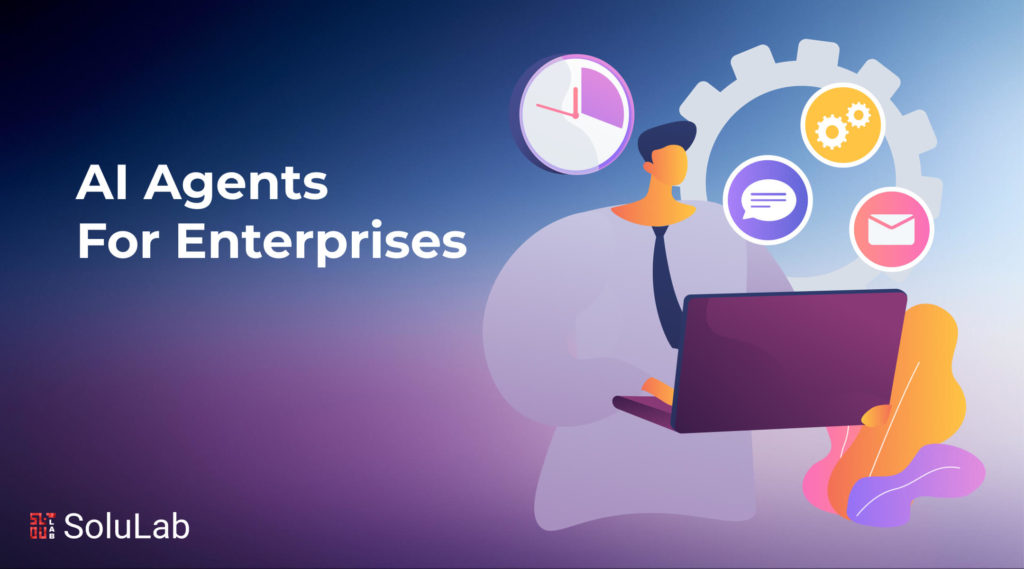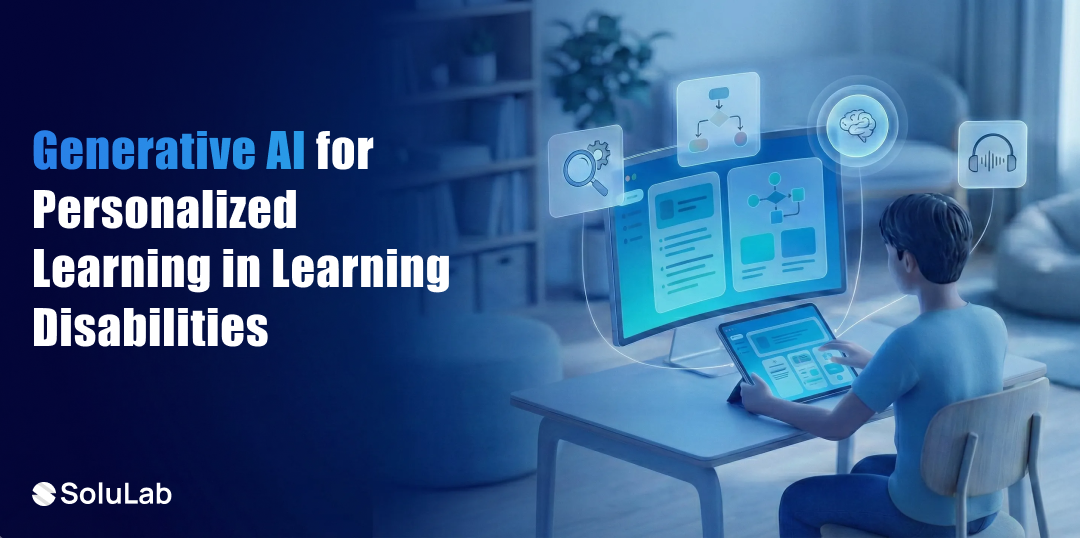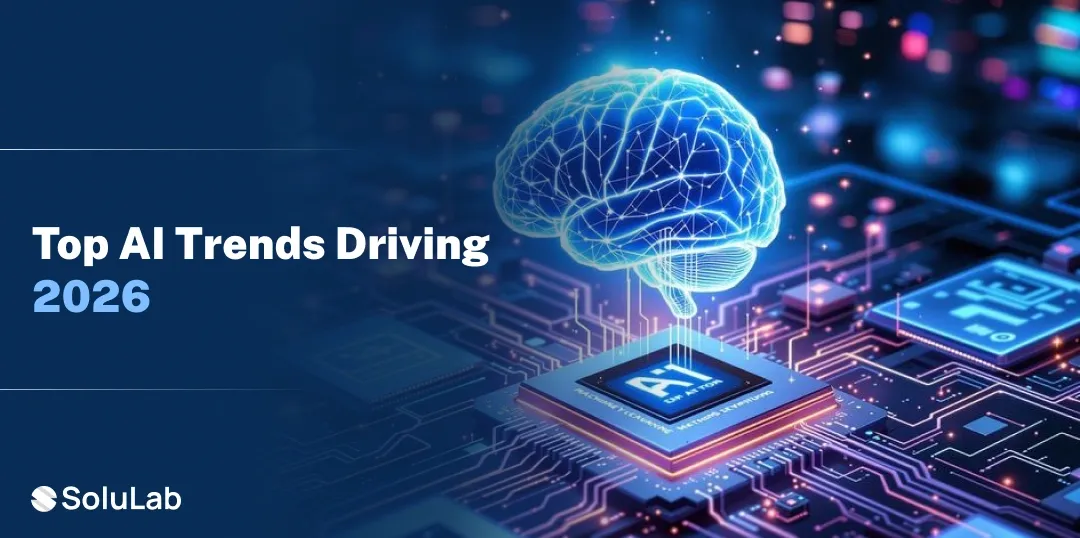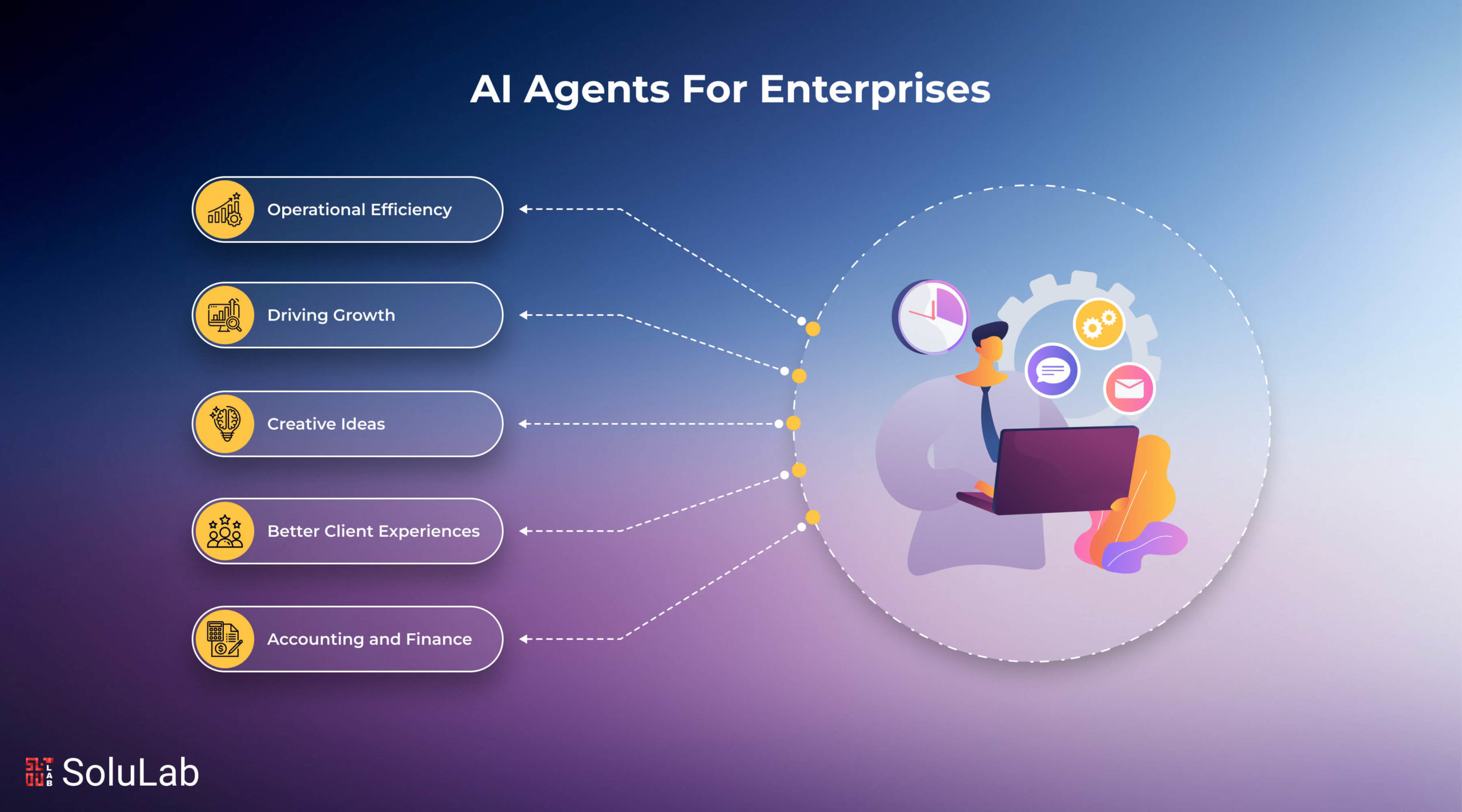
In today’s business dynamic, using artificial intelligence via intelligent agents is becoming profound within enterprises. These AI Agents for Enterprises are powered by advanced algorithms and machine-learning abilities that are transforming the traditional ways of business operations with even more efficiency, productivity, and informed decision-making. With the use of AI agents, 85% of customer service representatives working for companies use AI reports it helps them save time, organizations can automate routine tasks, analyze vast amounts of data at once, and provide valuable insights.
This blog will provide with you a brief introduction to what are AI Agents, how are they quickly transforming the ways enterprises operate, and the impact of AI agents on enterprises. Using these intelligent agents is bringing changes to systems and helping organizations adapt to the challenges of the digital era.
What are AI Agents?
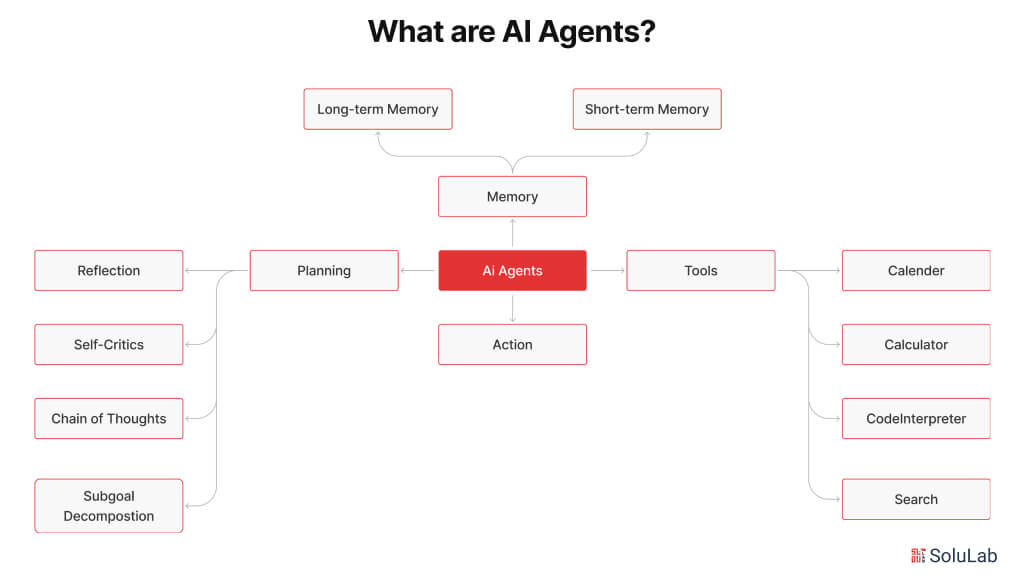
Artificial intelligence agents are a class of intelligent software systems constructed to sense their environments, decide independently, and act on their own to accomplish certain set objectives. AI use cases have variable intelligences that make them adapt and learn from experiences, unlike traditional software that is characterized by strict adherence to instructions. AI agents may collect information from several sources and analyze it, understand, and act on natural language input, and even conduct some tasks on your behalf. For instance, an AI agent will make reservations for travel, schedule meetings, and recommend things that might interest you.
The real powers of AI agents lie in their learning abilities. With machine learning algorithms, the agents can review data, identify trends, and henceforth improve, little by little, what they do. In that sense, as a result of continuous learning, they become proficient at their jobs.
AI agents show great business potential. They can drive innovation, enhance user experience, and drive efficiencies. AI bots, for example, answer standard questions in customer support, making human agents focus on trickier problems. They do data-driven investment judgments and market trend analysis in the domain of finance.
Artificial intelligence agents of infinite possibilities continue to increase. We can anticipate that the more powerful and more intelligent agents will progressively keep revolutionizing how human beings will interact with technology and the physical environment in the future.
Role of AI Agents for Enterprises
AI agents are fast proving to be very essential tools for any business keen on improving customer experience, increasing decision-making, and enhancing processes. These enterprise AI agents are fast changing quite some corporate processes since they can sense, learn, and act on their own. Here are some of the major roles played by enterprise AI agent solutions. AI will generate between $1.4 trillion and $2.6 trillion of value in marketing and sales globally.
Increased Operational Efficiency
- Repetitive jobs become automated: AI agents can increase the speed of operations by handling routine jobs like data entry, invoice processing, and customer service calls. Workers now have more time to dedicate to strategic activities.
- Predictive maintenance: AI agents in Enterprises can detect potential equipment failures with the analysis of the data provided by the equipment. This allows for proactive maintenance and minimizes costly downtime.
- Supply Chain Optimization: AI Agents for Enterprises can help enhance supply chain operations with the use of agents in predicting demand, managing various levels of inventory, and identifying likely disruptions.
- Process Automation: Automation of end-to-end corporate processes using AI agents ensures no errors occur and boosts productivity.
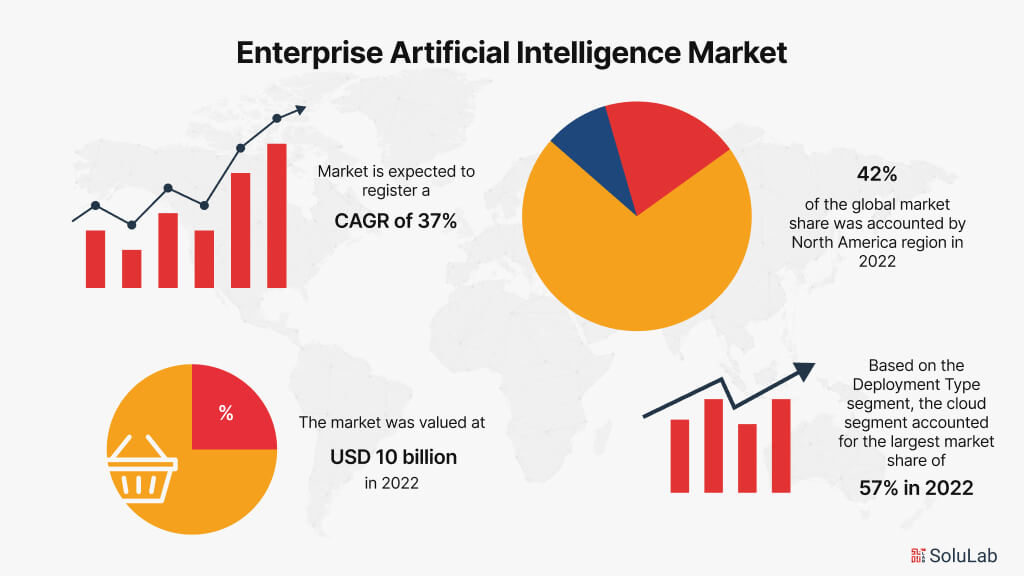
Driving Growth and Better Ideas
- Data-Drive Decisions: A huge amount of data can be analyzed by the AI enterprise to find patterns, trends, and insights that help in making strategic decisions. This is known as data-driven decision-making.
- Product Development: AI agents in Enterprises can support an increase in time-to-market, design optimization, and the development of new product ideas.
- Customer Segmentation: AI agents will contribute to the discovery of clear customer categories by analyzing consumer data and enabling the development of tailored marketing campaigns and products for AI enterprises.
- Market research: In the quest to discover new opportunities, artificial intelligence research can be applied to trends in the market, competition, and consumer choices.
Enhancing the Client Experience
- Personalized Customer Interactions: AI-driven chatbots and virtual support agents will be able to provide customized customer handling, answer queries, and solve problems more effectively.
- Customer Sentiment Analysis: AI agents in Enterprises detect the improvement areas and define the satisfactory parameters through customer feedback analysis.
- Recommendation engines: AI, on customer behavior and preference data, can be used to create personalized product recommendations.
- Fraud Detection: AI agents can help with detecting fraud and protect the company and its clients.
Challenges
- Data Quality and Privacy: For the implementation of AI agents in Enterprises, data quality and privacy need to be ensured.
- Talent Acquisition: The success of the AI Agents for Enterprises initiatives is based on talent acquisition and retention in AI.
- Ethical Considerations: Business entities should develop some ethical guidelines relating to their AI usage in order not to damage reputation and trust.
- Change Management: Proper planning and change management are required so that the AI agent can be accepted by the employees.
Operational excellence, creativity, and extraordinary customer experience are some of the things that can be achieved in businesses with the help of AI Agents for Enterprises. Enterprises can leverage AI agents in the supply chain by solving the problems connected with them and taking a competitive lead.
Technologies Behind AI Agents
It is not only the specific capabilities of AI agents that make them genuinely disruptive, rather it is how these capabilities collaborate to find solutions to actual problems faced by businesses. Let’s have a look at the most important capabilities that modern AI agents possess:
-
Large Language Models (LLMs)
Intelligence is built on the foundation of large language models also known as LLMs. Agents can have meaningful and fruitful discussions with clients with the abilities of LLMS, which constitutes an enormous improvement in artificial intelligence skills. These sophisticated models interpret language in the same way as experienced human agents, which means that they understand context, remember facts, and provide pertinent responses for the result, intelligent agents not only respond to the questions but also provide customers with smart nuance communication is supported and engaged by LLMs.
-
Natural Language Processing
Keyword matching and strict commands are no longer an issue for AI agents of today. I have a complete understanding of human language in all of its complexities. They can recognize the minor distinction between phrases such as I can’t log in and my password isn’t working and they can analyze context and intent in the same way that a person would. If a consumer has a question that is compromised of multiple parts or explains a complicated issue, this agency seamlessly, follows along and keeps the context intact for the entirety of the interaction
-
Machine Learning
Learning is becoming more intelligent daily on the other hand, AI agents evolve with each encounter on their own in contrast to traditional systems, which remain static in time without considerable human intervention. Continuously gaining knowledge from talks, assessing the results, and improving their response are all things that they do. Whenever they come across new situations or demands that are out of the ordinary, they modify their approach, mainly based on what has been successful in the past.
-
Networks of Neural Networks
The engine that makes decisions in neural networks can be thought of as a brain that is responsible for the operation. They can process an infinite number of data points, concurrently, gaining a grasp of how various bits of information are connected and influence one another. AI agents can make Decisions that are based on complex criteria with the help of a superior processing capability that the process, just like an experienced professional would neural networks give the intelligence that enables AI agents to be truly effective. This intelligence can also be used to recognize trends in the behavior of customers to solve problems that involve multiple steps.
Benefits of AI Agents for Enterprises
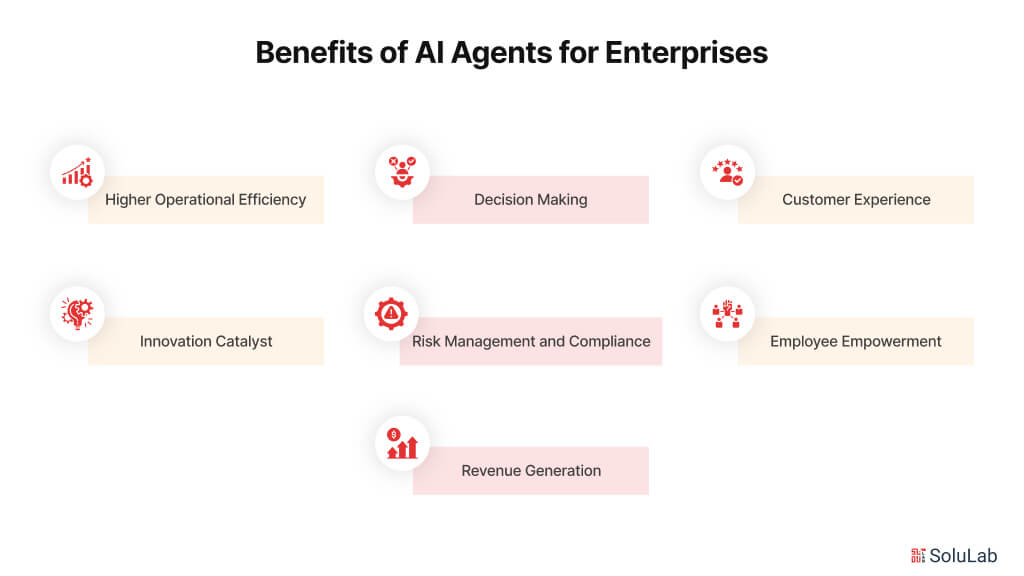
The AI agent use cases are tremendous assets for any business house in quest of increasing productivity, making better decisions, and improving customer experiences under their capability to reason, learn, and act on their own. Here are some benefits of the AI Agent for Enterprises:
- Higher Operational Efficiency: By automating repeated procedures, streamlining processes, and allocating resources optimally, save on costs and boost productivity.
- Decision Making: Convert huge reams of data into useful insights to make strategic decisions that get better than competition.
- Customer Experience: Using AI-powered technologies, provide personalized interactions, improve customer support, and raise customer satisfaction levels.
- Innovation Catalyst: Drive innovation in new products with AI-driven insights, explore untapped markets, and drive innovation culture.
- Risk Management and Compliance: Make use of AI-powered solutions to discover potential risks and assure compliance, all the while protecting sensitive data.
- Employee Empowerment: Augment human capability with AI-driven technologies, create new roles at work, and enhance the satisfaction of employees.
- Revenue Generation: Unleash new revenue streams using AI-powered analytics, enhance pricing strategies, and maximize sales.
Challenges of Using AI for Enterprises
While incorporating AI into businesses and enterprises, it becomes necessary to meticulously plan and execute. Speaking of this here are a few challenges that you may face by leveraging AI for Enterprises:
- Compatibility: Older systems use outdated technologies, patterns, and structures that are unable to keep up with modern technologies like cloud and AI. This disparity leads to the integration of barriers, impending with the smooth flow of data and communication between systems. Therefore, it is required to conduct a thorough system assessment to pinpoint compatibility issues before considering leveraging AI integration.
- Data Accessibility and Quality: The effectiveness of any AI application is dependent on their access to pertinent, and high-quality data. This data silos within legal systems for driving valuable insights. Hence, it has become important to implement data cleansing procedures to enhance the quality of data that already exists.
- Security: Data Security poses a universal challenge, which makes it crucial to deploy strong cybersecurity measures to identify and address any possible irregularities.
- Ethics and Regulation: Scalability can make ensuring the adherence of AI systems to ethical systems and legal regulations a difficult task. Therefore, opting for the adoption of explainable AI methods can improve transparency in the AI decision-making process.
Generative AI for Enterprises
Generative AI for enterprises is allowing businesses to innovate, increase productivity, and fuel growth by generating new formats for content such as text, graphics, and code from existing data. Probably one of the most important gen AI use cases in the workplace is content generation. On the one hand, producing high-quality content can be done by AI-powered systems, which help to create blog posts, entries, product descriptions, social media content, and even marketing text. By 2025, AI software will grow 50% faster than the overall software market, In that sense, this will allow organizations to increase their content output and reach larger audiences while saving time and resources.
Moreover, Generative AI for enterprises will play a very significant role in revolutionizing new product development. AI can reduce the time scale involved in developing a product and bring down expenses by coming up with design concepts, prototypes, or even simulations. For example, generative AI can be used in the automotive industry to develop new automobile models that are optimized for performance, safety, and aesthetics.
Customer experience is another huge area of impact for generative AI for enterprises. On the linguistic end, more complex AI-powered chatbots or virtual assistants could solve personalized customer service, questions, and even troubleshooting. This lightens the burden on human reps while raising customer satisfaction and loyalty. Difficulties, however, are not devoid of the general adoption of generative AI. Voluminous amounts of data are needed to train generative models; hence, data security and privacy are very important. Gaining and keeping trust will involve making sure that quality and accuracy are ensured in content generated by AI.
Notwithstanding these difficulties, Generative AI for enterprises has enormous potential advantages for businesses. Businesses that use this technology can increase productivity, create new revenue sources, and obtain a competitive edge. In the upcoming years, we should anticipate seeing even more cutting-edge applications arise as generative AI develops.
Real-World Uses of AI Agents for Enterprises
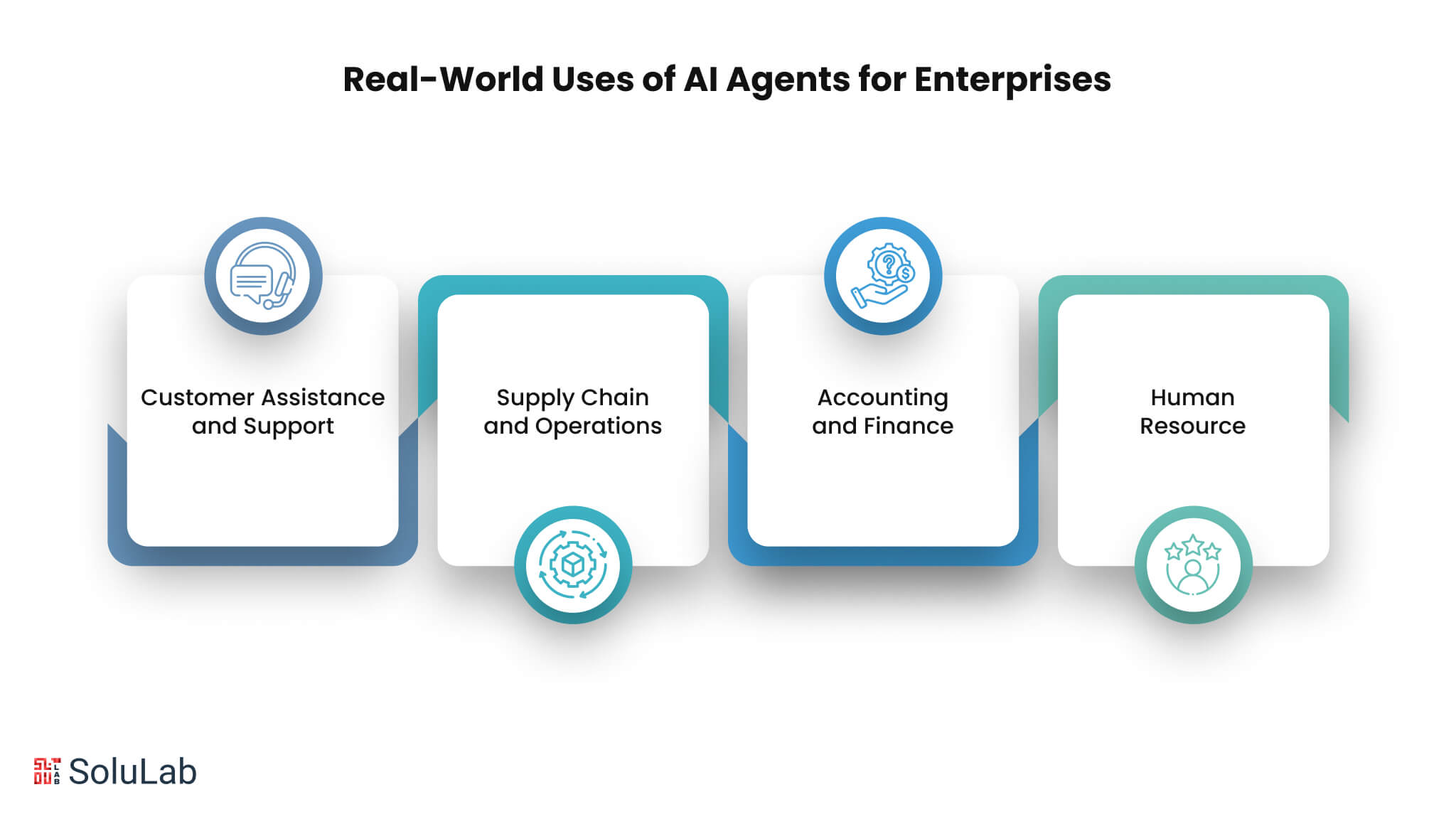
AI agents in retail are no longer a science fiction idea but have quickly become integral to business operations in many industries. They bring real value and transformation along with them since they can reason, learn, and act autonomously.
1. Customer Assistance and Support
These agents in artificial intelligence are responsive to the consumer’s request, handle a huge number of requests, and have challenge-solving capabilities. Via analysis of consumer data, AI agents can recommend more personalized services, increasing customer happiness and loyalty. AI agents track client feedback across multiple channels to spot trends and areas for development.
2. Supply Chain and Operations
AI agents can perform demand forecasting, inventory level management, and improvement of logistics, which will help reduce costs while enhancing productivity. AI for startups uses evaluation equipment data to forecast possible problems, enabling preventive maintenance and thus minimizing downtime. AI-powered tools could check products for flaws to make sure quality requirements are satisfied.
3. Accounting and Finance
The Finance AI agents can analyze financial data for any suspicious activity and suspend fraudulent transactions. AI agents can help companies in predicting their financial success by analyzing historical data for better decision-making. AI agents can automate routine procedures such as expenditure reporting, reconciliation, and invoice processing to free other resources to increase productivity.
4. Human Resource
HR AI agents can rank applicants against the job requirements, schedule interviews, and review applications. The agent artificial intelligence that examines data about employees can recommend ways to improve employee satisfaction and point out potential problems. Employers may be able to use the data-driven insights provided by AI agents to find areas for improvement and strengths in their workforce.
Related: AI Agents in HR Industry
Future Trends in AI Agents
The future of AI agents will be developing quickly and have the potential to change radically in most industries and interactions of humans with machines. Increased intelligence and autonomy are a major wave.
The agent in artificial intelligence of the future will come endowed with sophisticated self-learning skills which would make them able to adjust to new situations without constant human supervision. These agents will also be multimodal, allowing them to process and understand data from diverse sources, be they in the form of audio, images, or text. This creates more comprehensive and natural interactions that take place between humans and machines. Another school of thought emphasizes more interactions with the physical world. To incorporate physical-world interactions with AI agents for Enterprises, embodying AI will work with available robotics and other devices. It will unlock a large number of new application areas for AI in general, including logistics, manufacturing, and healthcare.
Moreover, the trend will be toward enabling entirely seamless collaboration between humans and AI agents—where the AI complements and supports but does not replace human labor as enterprise AI agent solutions. Then, within the AI agent ecosystem, industry-specific agents, tailored to work more for industries with specific needs, will also flourish. For example, AI agents in medicine will help in patient care, medication discoveries, and diagnosis or diagnostics. Within finance, AI agents in healthcare may be possibly used in algorithmic trading, risk assessment, and fraud detection. Such specialization in each of the sectors will lead to waves of innovation and efficiency.
The amount of money spent on artificial intelligence software is expected to climb from $33 billion in 2021 to $64 billion in 2025. This development is a result of the rapid adoption of AI during the pandemic as well as the rise in the number of businesses that provide AI software. Although AI agents hold a lot of potential benefits, these issues regarding prejudice, data privacy, and ethical considerations all must be properly taken care of. Strong frameworks shall be created as AI technology develops to ensure AI is applied for good and in an ethical way toward society.
It is the time for AI agents in sales —full of new possibilities and enormous potential. These intelligent technologies will cause a change in our lives and workplaces, bring up economic expansion, and spur creativity as never before with their sophistication.
Conclusion
The fast transition of AI agents in Enterprises from theoretical ideas to business-critical tools seems more and more imminent across diverse sectors. It has the potential to automate tasks, analyze data, and make intelligent decisions that transform the business process and accelerate innovation. As seen in the previous discussion, AI agents have had so much applications in a host of industries, including marketing, operation, and finance. Enormous potential lies ahead for AI bots. The next-generation, more powerful, smart agents will turn into a reality through advances in robotics, machine learning, and natural language processing. But all this has to be done with an emphasis on privacy, ethics, and human-centered design in the creation and application of AI with the help of an AI agent development company.
Perhaps the most valuable resource that any business has when it comes to the complicated process of AI and to hire an AI developer for collaboration with experienced AI experts. With its deep knowledge of AI and machine learning, SoluLab helps businesses harness AI agents to meet their objectives. SoluLab offers tailored, full-stack AI solutions compatible with variable needs, ranging from strategy formulation to implementation and ongoing support.
Let SoluLab help you unleash the power of utilizing AI agents for your company. Contact us now to discuss your AI projects and find out how we can assist you in meeting your goals.
FAQs
1. What are the major benefits of AI agents to businesses?
Enterprises can utilize AI agents in several ways to develop a better customer experience, reduce costs, and have the capability of recognizing untapped markets. AI agents can significantly boost corporate growth by process automation of repetitive tasks, data evaluation in huge volumes, and facilitation of personalized interactions.
2. How can operational efficiency be improved with the help of AI agents?
AI agents improve operations by smoothing workflows, predicting maintenance needs, and automating tasks hitherto repeated by human beings. It can analyze equipment data and predict possible failures, thus preventing expensive downtime.
3. What are some of the challenges to the implementation of AI agents in a business environment?
Implementation of AI agents may be associated with problems related to data quality, privacy, and the need for qualified staff. Careful planning at all levels of work implementation will be needed to overcome these problems, along with investment in infrastructure and a clear understanding of what results the surveyor is trying to achieve.
4. How can artificial intelligence agents create innovation?
It may facilitate innovation through analyzing the market trends, recognizing client demands, and thus coming up with new product ideas. They help in increasing a product’s performance, accelerating development times, or simply optimizing its design.
5. How does SoluLab help in implementing AI agents in my business?
SoluLab provides clients with end-to-end AI solutions for the needs of every business. Our experts can help in AI strategy development, data analysis, model formation, and deployment. We can enable you to leverage the power of AI agents to achieve your business goals by tapping into our extensive understanding of AI and machine learning.


